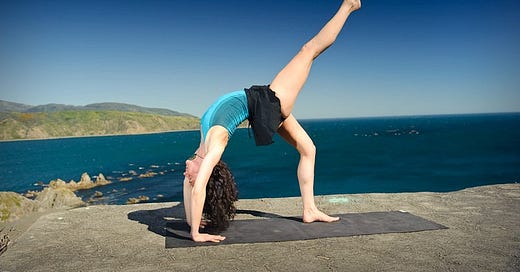As an actor and a yogini since my teens I've learned how to compartmentalize experience. If I go onstage with whatever my current personal issues are it'll be an absolute mess. I have to suspend my life in order to portray another.
The same goes for teaching yoga. While I hold a brief talking circle type check-in at the start that I call "checking the human weather patterns in the room", if I were to carry my own personal story through the class it would become a counselling session. I ask folks, myself included, to show up with whatever is going on for them, but then we all do our best to let go of the stories. We co-create an environment of focus on the breath as it bridges the mindheart to the body.
When I'm in meditation, or balancing on one foot, I notice thought/feelings that arise but if I let them take centre-stage then I'll fall out of the balance. Or it might still look from the outside like I'm meditating, but instead of the dharana (focus) and dhyana (absorption) necessary to open into samadhi (unity consciousness), I'll just be chewing over pedestrian problems on the inside while looking adept on the outside. Which is why I consider silent, seated meditation to be advanced. Without a guide or a guru to continually, and hopefully gently, steer the mind out of its grooves of fixation on the turmoil, we're likely to stew in our own juices and perpetuate old, and often unhelpful, ways of perceiving and operating in the world.
It's the ability to put-aside, for now, the painful, distracting, difficult aspects of our lives that, curiously, opens us to the insights that aid in moving us out of those aspects. Or rather, instead of insight I might say outer-sight.
Going beyond enables clarity.
Like Moriarty says portentiously to Sherlock, "Widen your gaze Holmes, widen your gaze." Easier said than done, of course.
Which is why yoga is all-ways a practice, never a performance. In order to be truly present with another being or with a situation, a landscape, or a task I must develop my ability to let all else go, for now. Which requires trust. Trust that whatever it is will still be there when I return my attention to it. And it's this skill, this practice of trusting, that we cultivate in Savasana.
When I first began teaching at the turn of the century (how grandiose that sounds!) people would often try to leave before Savasana, the resting pose at the end, and I had to work hard to educate them about why this posture is so integral. It's what enables us to integrate all the activity and learning of the session we've just been through. It's like a sponge gathering up the juice spilled on the counter. We become that sponge, but only if we can widen our gaze, open our psychic pores, and receive.
When we fixate we tighten our attention and energies, and usually it's done out of fear. We furrow our brow trying to see, not only creating wrinkles in the skin, but also obfuscating the strong eye’s ability to see. So again, we're learning to trust that widening the gaze helps more than narrowing it.
Over the past 22 years of teaching I've seen so much shift in humanity's receptivity to yoga, meditation, mantra, and prayer. It's heartening. So now, especially after the global trials of the past few years--the threshold we've all been passing through in our own ways--most people crave and request Savasana. They crave the permission and opportunity to be still, to rest, to receive. Yoga Nidra is actually known beyond small yogic circles! So I take heart that we humans can and do evolve.
Why do I say presence is extreme compartmentalization? Like an extreme sport, the true presence of being one-with either comes naturally, as it does with children, or it comes from dedication. Or both.
The rewards of cultivating presence are great. When I'm able to be present I take things less personally and can see a wider view of the situation. If you've ever flown or hangglided in "real life" or in your dreams you know in your bones what it feels like to soar, to rise above, to be bird-like. It's ecstatic to be that expansive. I was so ecstatic in this image below that even though my stepfather could barely see me at 1,000 feet above the Georgia-Tennessee terrain, he could still hear me laughing hysterically.
Whatever it engenders physiologically in endorphins or adrenaline, on a relational level it also elevates us enough to see the pathways for our own evolution, individually and collectively. By being present we can be somewhat omniscient, making wiser choices a greater possibility than when we fixate on the problem.
Which leads me to a phrase that's been my personal mantra in the past few years, "It'll be apparent." But that's for another post :)
Maybe it’s more accurate to say that extreme compartmentalization helps get one to presence. It’s akin to the classic process of neti-neti—not this, not that—the whittling back of what one is not to eventuate upon the ‘I am that that I am’-ness. But once there, abiding presence does not need to compartmentalize anymore. It encompasses all-that-is without fixating on a particular issue or aspect. Or, more precisely, presence is all-that-is. It’s the mind’s big open sky and if thought/feeling clouds arise it sees them float on by without hitching rides on them.






